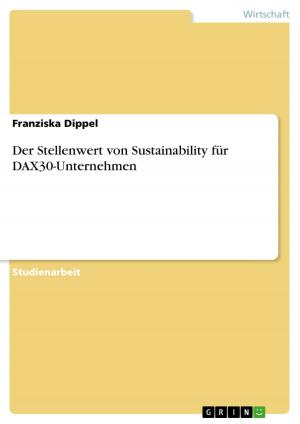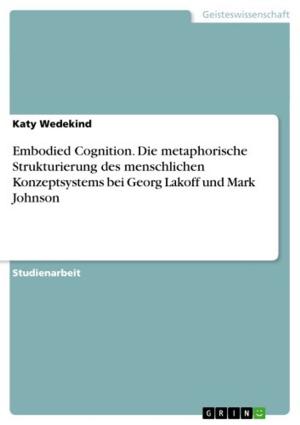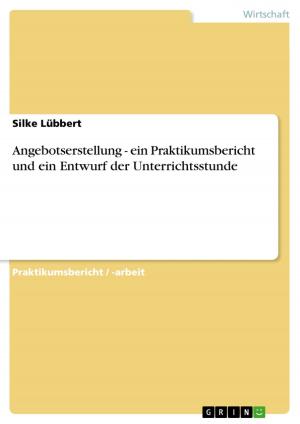| Author: | Carsten Dümichen | ISBN: | 9783656299943 |
| Publisher: | GRIN Verlag | Publication: | October 31, 2012 |
| Imprint: | GRIN Verlag | Language: | English |
| Author: | Carsten Dümichen |
| ISBN: | 9783656299943 |
| Publisher: | GRIN Verlag |
| Publication: | October 31, 2012 |
| Imprint: | GRIN Verlag |
| Language: | English |
Seminar paper from the year 2011 in the subject Economics - Micro-economics, grade: 1,7, University of Erfurt, language: English, abstract: Table of Content 1. Introduction 2. Historical background 2.1 History of Energy supply 3. European Perspective 4. Current Situation 5. Why Regulation is needed 6. Liberalisation 6.1 Legal background of liberalization 6.1.1 European Single Market policy 96/92/EG 6.1.2 European Single Market policy 200/54/EG 7. Regulation 7.1 Cost-based Regulation 7.2 Why changing it to incentive regulation 8. Incentive Regulation 9. Conclusion 10. References Regulation of Electric Power in Germany 1. Introduction The electricity market in Germany was faced with loads of changes since the 19th century, when it all began due to Werner von Siemens (and among others) and his first electric generator. But soon electricity became a public good and the governments realized, that it needed to be provided to every citizen. Therefore many different systems, regulations and deregulations were implemented over time. After a historical overview and a European perspective on the electricity market, we present you the Liberalization process and its cost-based regulation and, as a last point, the change to incentive regulation. 2. Historical background 2.1 The History of Energy Supply in Germany With the first street light in Berlin in 1884 the history of public energy supply in Germany begun. Following the example of Berlin and other cities in the world, in the next decades other German cities developed an urbanized network of several power stations. Already at the beginning of the 20th century there was laid out the first long-distance cable and there were several German power stations which offered a cheaper price for power at night for consistent capacity utilization. In 1938 the German Energy Industry Act mandated the electricity supply under the supervision of the German Reich, therefore the National Commissioner was then responsible for the price and introduced the first basic fee. Quick after World War II the biggest electricity suppliers reached again the pre-war level, but in 1954 the separation of the electricity grid network of the German Democratic Republic (GDR) and the Federal Republic of Germany (FRG) was conducted and still inflicts some problems today. After that, the first German nuclear power plant 'Grunremmingen A' (1966) started supplying electricity to the grid. In 1974...
Seminar paper from the year 2011 in the subject Economics - Micro-economics, grade: 1,7, University of Erfurt, language: English, abstract: Table of Content 1. Introduction 2. Historical background 2.1 History of Energy supply 3. European Perspective 4. Current Situation 5. Why Regulation is needed 6. Liberalisation 6.1 Legal background of liberalization 6.1.1 European Single Market policy 96/92/EG 6.1.2 European Single Market policy 200/54/EG 7. Regulation 7.1 Cost-based Regulation 7.2 Why changing it to incentive regulation 8. Incentive Regulation 9. Conclusion 10. References Regulation of Electric Power in Germany 1. Introduction The electricity market in Germany was faced with loads of changes since the 19th century, when it all began due to Werner von Siemens (and among others) and his first electric generator. But soon electricity became a public good and the governments realized, that it needed to be provided to every citizen. Therefore many different systems, regulations and deregulations were implemented over time. After a historical overview and a European perspective on the electricity market, we present you the Liberalization process and its cost-based regulation and, as a last point, the change to incentive regulation. 2. Historical background 2.1 The History of Energy Supply in Germany With the first street light in Berlin in 1884 the history of public energy supply in Germany begun. Following the example of Berlin and other cities in the world, in the next decades other German cities developed an urbanized network of several power stations. Already at the beginning of the 20th century there was laid out the first long-distance cable and there were several German power stations which offered a cheaper price for power at night for consistent capacity utilization. In 1938 the German Energy Industry Act mandated the electricity supply under the supervision of the German Reich, therefore the National Commissioner was then responsible for the price and introduced the first basic fee. Quick after World War II the biggest electricity suppliers reached again the pre-war level, but in 1954 the separation of the electricity grid network of the German Democratic Republic (GDR) and the Federal Republic of Germany (FRG) was conducted and still inflicts some problems today. After that, the first German nuclear power plant 'Grunremmingen A' (1966) started supplying electricity to the grid. In 1974...















